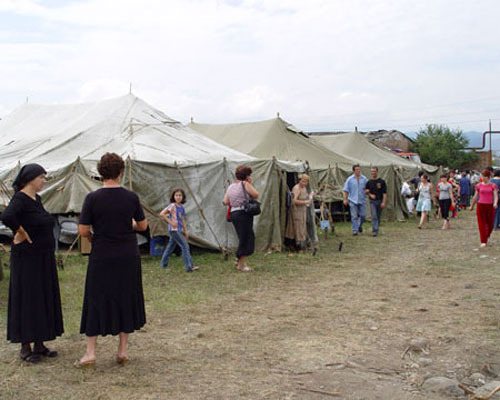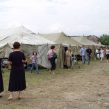
Government of Ingushetia Tries to Resolve Ossetian-Ingush Conflict
Publication: Eurasia Daily Monitor Volume: 6 Issue: 180
By:

On September 25, a group of Ingush civil activists made an unprecedented public statement, harshly criticizing the policy of Ingushetia’s President, Yunus-Bek Yevkurov, regarding the disputed lands in the Prigorodny district of neighboring North Ossetia (www.ingushetia.org, September 25). President Yevkurov had previously said that North Ossetia’s Prigorodny district would remain part of North Ossetia and that Ingushetia had no intention to lay claims to the contentious lands anymore (www.rusnovosti.ru, August 17). The well-known Ingush human rights defender Magomed Mutsolgov stated: "President Yevkurov is not entitled by the constitution of the republic of Ingushetia to make any decisions about the future of the Ingush people’s territories. The parliament of Ingushetia does not have this right either. This is the sovereign and inalienable right of the repressed Ingush people, which should be expressed in a referendum, and only the Ingush people are allowed to decide the fate of its native, historic homeland."
The other side of Yevkurov’s position was that he demanded that the Ingush refugees who left their homes or were driven out during the short 1992 Ossetian-Ingush conflict return to their homes in North Ossetia’s Prigorodny district. He defended himself: "Yes, I could hit the table and say Prigorodny is ours, but then the matter [the issue of Ingush refugees] would be stalled for another 17 years [17 years have passed since the 1992 conflict]. Today there is a real opportunity to return people to their homes, this is what we are trying to achieve. Besides, we need to support those [Ingush people], who live there now" (www.ingushetia.ru, September 28).
Ingush refugees returned to North Ossetia in large numbers, not all of them to their original homes, but rather to specifically designated areas, typically situated far away from their native villages and the city of Vladikavkaz. Estimates on Ingush refugees vary widely from several thousand up to 60,000 and more.
In an unusually friendly move, the head of North Ossetia, Taimuraz Mamsurov, visited his counterpart in Ingushetia to discuss issues between the two sides informally (www.ingushetia.ru, September 29).
A short but bloody ethnic conflict between the Ossetians and the Ingush in Prigorodny district of North Ossetia and Vladikavkaz took place in the fall of 1992. Over 600 people were killed on both sides during several days of fighting; thousands of homes were burnt down and most of the Ingush population, estimated at the time at 30,000-60,000, left or were driven out into neighboring Ingushetia. The conflict’s origins were rooted in a territorial dispute over part of the Prigorodny district of North Ossetia and its capital Vladikavkaz. Many Ingush felt that they were unlawfully deprived of the lands, which had belonged to them prior to their deportation by Stalin in 1944.
Even though the authorities in Moscow and Vladikavkaz were both anxious to proclaim the territorial dispute over in 2006 and later in 2007, this issue continues to remain a very sensitive topic to Ingushetia and its people. For example, Article 11 of the Ingush constitution states the wish "to return the unlawfully alienated lands" to the republic (https://www.ingushetia.ru/institute/constitution.shtml). Therefore, North Ossetia is concerned that after the return of the refugees, another round of fighting over the disputed lands might begin and has tried to keep the returning Ingush refugees as far as possible from its capital Vladikavkaz.
North Ossetians widely believe that the perpetrators of the terrorist attack on the school in the town of Beslan in September 2004 were ethnic Ingush; that plus the fact that other attacks in North Ossetia are blamed on the Ingush further diminish the possibility of an easy reconciliation between the two peoples. The precarious security situation in Ingushetia and the relative stability of North Ossetia create additional political obstacles for a mass return of Ingush refugees to their homes in North Ossetia.
Despite the generally negative background for resolving the Ossetian-Ingush dispute, several recent trends have enhanced the chances for the return of the Ingush refugees to North Ossetia. Ingushetia’s leadership has conveyed the message to the Russian political leadership that the explosive situation in Ingushetia is caused in large part by the fact that the Ingush people feel that their interests are being ignored when it comes to the loss of Prigorodny district (www.ingushetia.ru, August 28).
The Ingush insurgents obliquely confirmed the official view of Ingushetia by accusing the pro-Moscow authorities of Ingushetia of selling out their homeland in Prigorodny (www.hunafa.com, September 18). Moscow, eager to quell the unrelenting wave of violence in Ingushetia, might be tempted to help the Ingush to return to North Ossetia, as an easy way out. On the North Ossetians’ side, their positions might soften as well, because Moscow has presumably "won" lands for them in South Ossetia. Given the fact that the majority of the ethnic Ossetians living in the disputed lands originate from South Ossetia or the inner districts of Georgia, this thinking may have serious implications for North Ossetians’ flexibility.
Meanwhile, municipal elections are scheduled to take place in Ingushetia on October 11. A special commission on the Caucasus formed in the upper chamber of the Russian parliament held a meeting to try to design a way of supporting the elections using "moral-political means." The local authorities have vowed not to allow any supporters of the insurgency to be elected (www.kavkaz-uzel.ru, September 29). The problem with this is that if there is no legitimate internal consensus on important political issues like the disputed territories in Ingushetia, it will be very difficult to reach an agreement with the neighboring Ossetians. And, if there is no lasting agreement on contentious issues, it will likely produce a situation in which the issue will be exploited by various political actors. As a sign of Moscow’s ongoing paranoia about the involvement of foreign forces in jeopardizing the security situation in the North Caucasus, foreigners are prohibited from visiting the Prigorodny district unattended unless they receive special permission from the Federal Security Service (FSB).




